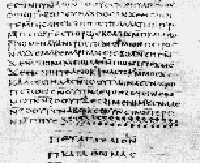Unpacking and publishing the Phaistos Disk since 1993
HOME | PREVIOUS | NEXT | SITEMAP

- This Gnostic sect, followers of Valentinus, believed the Cross is the secret of the Limit between the Father of Greatness and the lower Earth. The Valentinians practiced rituals and ceremonies intended to render themselves invisible, after death, to the powers of heavens their souls might encounter on ascent towards the Light.
The Valentinians possessed a Gospel of Truth. St. Iraneus accused them of boasting they had more gospels than are actually in existence and that they made them up. Two schools of thought developed within the sect causing a schism. One school believed the body of Jesus is psychic and at baptism the Spirit (the Word of the Mother from on high, Sophia) descended to him in the form of a dove, awakening his psychic element. The other school believed the body of Jesus is spiritual because the holy Spirit, Sophia, had descended to Mary. There was a disagreement as to whether the supreme divinity is a monad or a dyad.
Both schools taught that from the angels, born of the union of Sophia and the Savior, proceed Three Principles - Material, Psychic, and Spiritual. These three correspond to the three races of humanity and their higher and lower destinies. The three races are pre-figured by Cain (material), Abel (psychic), and Seth (spiritual). The Valentinians believed that after the spiritual seed which is dispersed among beings has attained to perfection, the Wisdom (Sophia) will re-enter the Pleroma where she will be espoused to the Savior, with the Pleroma as the heavenly bridal chamber. The spiritual beings will attain to the Pleroma, while the souls of the psychic will attain to the Plane vacated by Sophia, but will be cut off from the Pleroma by Horos-Stauros and become brides of the angels who surround the Savior. Then, the latent heat in the Earth will flame forth, completely destroying matter and the souls of the material. All matter will pass into nothingness.
"It is a faithful person fond of learning who is the worker of truth." (The Sentences of Sextus, Gnostic papyri)
- Lived in Alexandria, Egypt (110-36 CE). When he was defeated in his candidature for the bishopric, he broke from the Church and withdrew to Cyprus to found his school there. He taught in Rome from 136-165 CE, and his disciples were Marcus, Ptolemy, Theodotus, Heracleon, Secundus. and Epiphanius.
Valentinus taught that the higher primordial world began as multiple series of emanations issuing from the supreme and invisible Father in successive couples. The origin of all things is a perfect aeon called Pro-Father, described also as the abyss, who is incomprehensible and eternal and dwells in profound repose. Co-existent with the pro-Father is a Thought which is also Silence. Thought and pro-Father unite to emanate the eight pairs of aeons (Ogdoad). Then, ten more are emanated, then 12 more, totaling 30 in all - the Pleroma, or Plentitude. The last Aeon, Wisdom (Sophia), tries to imitate the pro-Father by emanating as he had done, without a partner. The result is a terrible imperfection, the beginning of the created world.
Sophia and her creation are cut off from the Pleroma by the Horos-Stauros, Limit-Cross, and strive to re-ascend (as Malkuth seeks to re-unite with Kether in Kabala). The fallen Sophia, the Hebrew Akhamoth, prays to be readmitted into the Pleroma, and her prayers are heard. After a savior in dispatched to her, they give birth to angels. Among. these angels is the demiurge, who creates the cosmocrator, the devil, who rules over the visible heavens and the Earth. The demiurge, in this account, in not unrighteous. Called Metropator (Mother/Father), the demiurge directs the economy of the universe, and joyfully welcomes the savior and learns from him.
In nearly all these accounts of Sophia and the other names given to the Great Mother, she invariably loses her connection to the Pro-Father by either being attracted downward to the lights or either trying to give birth by herself alone to either an emanation, a sphere, an aeon, or the Savior. She is always fallen and becomes the archetype of the "Fallen Woman." Why this must be the case has to do with, I think, the problem of these men who can't seem to work around the absolute need for a woman in order get any birthing of anything done. The exceptions I can think of are found the mythology of ancient Greece in which the child Dionysis was born from the thigh of Zeus and when the child Athena popped out of the head of Zeus. It just seems to me, and perhaps I am being overly interested since I am female, that having to have an equal partner for procreation, either physically or metaphorically, has always been a problem for the ego of some men, especially these Gnostics who are determined to base spiritual reality upon a hierarchy or linear model. And then that linear model is carried forward throughout time in all the historical religions, that are still insisting on an ultimate deity that is male and is some kind of gaseous vertebrate.